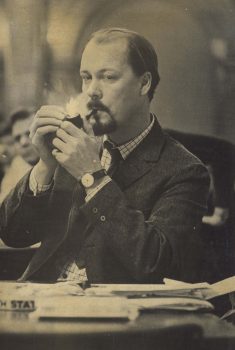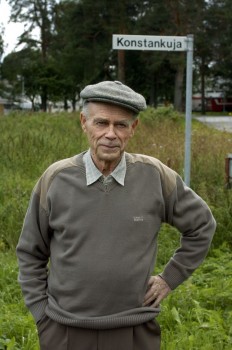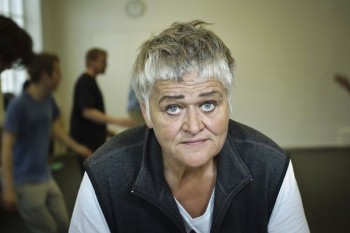Search results for "2010/05/song-without-words"
Three prose poems
30 September 1986 | Archives online, Fiction, poetry, Prose
Prose poems from Runot ja proosarunot (‘Poems and prose poems’,1966) and Maan ja veden välillä (‘Between land and water’, 1955 ). Introduction by Pirkko Alhoniemi
Underground
I went underground, I was looking for my brother’s grave, and I saw him lying under a transparent slab of marble. His face was like gold, death had passed from it, and I knew I no longer mourned him. I came above ground. At the edge of the graveyard there was a round tower made of stone and I was high up in the top of the tower. There stood my brother in dark trousers, white shirt, looking exactly the same, in the same position as in the dim photograph someone, I don’t remember who, took of him when he was about to go fishing, hands in his pockets, head held high, he was looking up at something, not at me. And I asked him: ‘Did it hurt when the bullet went through your head, when the exploding bullet went through your head in the battle of Karhumäki, and you were still alive at the first aid station and you said something they told us about in a letter.’ He answered, ‘Yes, it did hurt.’ ‘What’s your life like now, tell me.’ I said. He raised a hand and pointed to the sky. The sky was blue, and white clouds were scudding across it. More…
Oh heiferiness and humanness
30 September 2007 | Fiction, poetry
Kesäillan kevyt käsitteellisyys.
III laulu: Suvisimfonia, omistettu Joel Lehtoselle.
‘A summer evening’s slight conceptualness’.
III song: Summer symfony, dedicated to the author
Joel Lehtonen (1881–1934)
From Eros (WSOY, 2002)
A summer evening’s slight conceptualness
Ah summer evening, and its eveningness,
its prodigious wonders and their bridgefulness
when the nightunited seamlessness
steals into one’s heart with restfulness
O heiferiness and humanness,
ah shivering shimmeringness,
innocents’ innocuousness
and vastness with its stresslessness –
five or six chicks of a dabchick,
and deep water, lapfulness.
Our blue sky’s mirrored changefulness!
the spruces’ tall topliness, their tips’ sacredness
the yellow-billed black singer’s flutiness.
Nested cosiness, mutual tootiness! More…
Mary Bloom
31 December 1983 | Archives online, Drama, Fiction
Introduction by Väinö Vainio
‘Is Mary Bloom about a revivalist religious meeting, a party political conference at which a new leader is born, or a rock concert? These are among the things that have been suggested. I don’t know. I don’t hope for restraint in the imaginations of those who choose.to interpret my work, although I observe it myself. The work of a writer is a part of life, it is an individual and collective experience that seeks, finds, takes and uses its materials like a motor machine. For those who create it the drama is real, as in the theatre, for the duration of the performance.’ Jussi Kylätasku
Characters
Mary Bloom
Martha, a doctor
Otto, a preacher
Disabled veteran
Serenity, his wife
Alcoholic
Cold Cal, a prisoner
Blind man, Deaf Wife More…
Midwinter in a minor key
23 December 2009 | Letter from the Editors
Finland’s end-of-year celebrations, both Christmas and New Year, take place in a thoroughly muted mode. At noon on Christmas Eve the Christmas Peace is rung out from the mediaeval cathedral in Turku, with the pious and seldom realised hope that peace and harmony will be unbroken for the following twelve days.
It’s true, though, that there’s little of the carousing that characterises Christmas celebrations further south; by and large, people stay behind closed doors, and there’s plenty of time, in the dark mornings and evenings and the brief twilight between them, to eat and drink and sleep – and, for those whose souls are not entirely claimed by the television and food-induced torpor, to read. More…
Poems
31 March 1978 | Archives online, Fiction, poetry
Poems from Laulu tummana tulevi (‘The song comes darkly’, 1976). Introduction by Pentti Saaritsa
1
I have longed for you
as the burning heath for rain,
I have asked for you
as fingers of moss for shade,
I have yearned for you
as the dusty mind for tears,
and I have loved you
as distant lightning the dark,
I have been in you
as flowering pine in the wind.
The blue will-o’-the-wisps dance,
strangers stitching happiness.
Silvery the spring mornings,
the trumpets bright in summer,
the autumns cranberry-red,
the white legend of winter. More…
Finlandia Junior Prize 2011
7 December 2011 | In the news
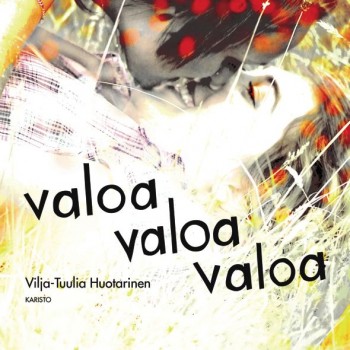 The musician Paula Vesala has chosen, from a shortlist of six, a book for young people by the poet Vilja-Tuulia Huotarinen, Valoa valoa valoa (‘Light light light’, Karisto). The story, which is set at the time of the Chernobyl nuclear power station disaster, poetically describes the passion and pain of first love, longing for mother and death.
The musician Paula Vesala has chosen, from a shortlist of six, a book for young people by the poet Vilja-Tuulia Huotarinen, Valoa valoa valoa (‘Light light light’, Karisto). The story, which is set at the time of the Chernobyl nuclear power station disaster, poetically describes the passion and pain of first love, longing for mother and death.
‘Not just what is told, but how it is told. The rythm and timbre of Vilja-Tuulia Huotarinen’s language are immensely beautiful. Her phrases do not exist merely to tell the story, but live like poetry or song. Valoa valoa valoa does not incline toward young people from the world of adults; rather, its voice comes, direct and living, from painful, confusing, complex youth, in which young people should really be protected from adults and their blindness. I would have liked to read this book when I was fourteen,’ commented Vesala.
The other five shortlisted books were a picture book for small children, Rakastunut krokotiili (‘Crocodile in love’, Tammi) by Hannu Hirvonen & Pia Sakki, a philosophical picture book about being different and courageous entitled Jättityttö ja Pirhonen (‘Giant girl and Pirhonen’, Tammi) by Hannele Huovi and Kristiina Louhi; a dystopic story set in the 2300s, Routasisarukset (‘Sisters of permafrost’, WSOY), by Eija Lappalainen & Anne Leinonen; a novel about the war experiences of an Ingrian family, Kaukana omalta maalta (‘Far away from homeland’, WSOY) by Sisko Latvus and an illustrated book about gods and myths of the world, Taivaallinen suurperhe (‘Extended heavenly family’, Otava) by Marjatta Levanto & Julia Vuori.
The prize, awarded by the Finnish Book Foundation on 23 November, is worth €30,000.
Landscapes of the mind
30 June 1986 | Archives online, Fiction, poetry

Tuomas Anhava. Photo: Otava
In his book Suomalaisia nykykirjailijoita (‘Contemporary Finnish writers’), Pekka Tarkka describes Tuomas Anhava’s development as a poet as follows: In his first work, Anhava appears as an elegist of death and loneliness; and this classical temperament remains characteristic in his later work. Anhava is a poet of the seasons and the hours of the day, of the ages of man; and his scope is widened by the influence of Japanese and Chinese poetry. As well as his miniature, crystalclear, imagist nature poems, Anhava writes, in his Runoja 1961 (‘Poems 1961’), brilliant didactic poems stressing the power of perception and rebuffing conceptual explanation. The mood in Kuudes kirja (‘The sixth book’, 1966) is of confessionary resignation and intimate subjectivity.
Anhava’s literary inclinations reflect his most important translations, which include William Blake’s The Marriage of Heaven and Hell (1959), selections of Japanese tanka poetry (1960, 1970, 1975), Saint John Perse’s Anabasis (1960), a selection from the works of Ezra Pound, published under the title Personae, and selections from the work of the Finland-Swedish poets Gunnar Björling and Bo Carpelan.
![]()
Song of the black
My days must be black,
to make what I write stand out
on the bleached sheets of life,
my rage must be the colour of death, to make my black love stand out,
my nights must be summer white and snow white,
to make my black grief burn far,
since you're grieving and I love you
for your undying grief.
Let the sun's rolled gold gild dunghills,
let the moon's blue milk leak out till it's empty,
we're not short of those.
The obscure black darkness of the cosmic night
glitters on us enough.
From Runoja (1955)
Landscape
30 June 2006 | Archives online, Fiction, Prose
(Landskap, 1919). Introduction by Juha Virkkunen
12 March
To begin with, there’s a great white field. The field is criss-crossed with low slender fences and little patches of yellow-green stubble peering up through the snow, and hare-tracks slanting away towards the stubble. But we won’t notice the fences and the stubble and the hare tracks. Because we’re going to take a wider, more sort of decorative view.
So we see the great white field. And where the field ends a dark green screen has been drawn. The screen has been cut short rather amusingly in the middle, so one can see yet another white held. This belongs to another village. And this other village itself has crept up timidly to the forest-clad hill and lies close to it, so we don’t notice this other village. Because we want to take a wider view of things. More…
Father
31 December 1980 | Archives online, Fiction, Prose
An excerpt from Laturi (‘The explosives expert’, 1979). Introduction by Pekka Tarkka
“It only took one good bash!” With tears in his eyes, chuckling and spluttering, Korppi, the sentimentalist, told the story of Linda’s love affair. Korppi hadn’t been an old codger then; like Chekov’s Versinin, he could have been dubbed the love-lorn major, although he was only a lieutenant for he had loved little Linda when he had been an officer guarding the refugees interned on Suursaari: interned not for their safety but for the protection of his country. “She loved getting parcels, oh yes, but she didn’t give a damn for me! And did I take what belonged to me?
Yes! No! I nibbled here and there but I never swallowed a whole bite … On the other hand, there were some who took a bite and swallowed it, one of them was called …”
“Selim!” shouted Enver.
Selim, that jelly. He was Korppi’s subordinate on guard duty, and had he known the other fellow had been flirting with Linda he would have killed her! But how could he have known? What took place under a clump of hills along a wooded lake shore… More…
Favour and fame: becoming a best-seller
10 April 2014 | In the news
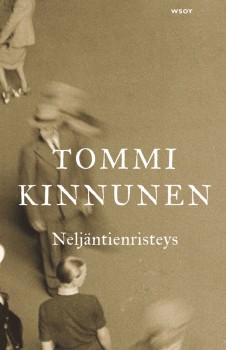 At the top of the list of best-selling books – compiled by the Finnish Booksellers’ Association – in March was the first novel by Tommi Kinnunen, a teacher of Finnish language and literature from Turku. In Neljäntienristeys (‘The crossing of four roads’, WSOY) the narrative spans a century beginning in the late 19th century and is set mainly in Northern Finland, focusing on the lives of four people related to each other. Undoubtedly well-written, it continues the popular tradition of realistic novels set in the 20th-century Finland.
At the top of the list of best-selling books – compiled by the Finnish Booksellers’ Association – in March was the first novel by Tommi Kinnunen, a teacher of Finnish language and literature from Turku. In Neljäntienristeys (‘The crossing of four roads’, WSOY) the narrative spans a century beginning in the late 19th century and is set mainly in Northern Finland, focusing on the lives of four people related to each other. Undoubtedly well-written, it continues the popular tradition of realistic novels set in the 20th-century Finland.
Finland is a small country with one exceptionally large newspaper, Helsingin Sanomat (read by more than 800,000 people daily). The annual literary prize that carries the paper’s name is awarded to a best first work, and candidates are assessed throughout the year.
In February the paper’s literary critic Antti Majander declared in his review of Kinnunen’s book: ’Such weighty and sure-footed prose debuts appear seldom. If I were to say a couple of times in a decade, I would probably be being over-enthusiastic. But let it be. Critics’ measuring sticks are destined for the bonfire.’ More…
Breathe out, breathe in
30 June 1999 | Archives online, Fiction, poetry
Poems from Nio dagar utan namn (‘Nine days without names’, Söderströms, 1998). Introduction by Bror Rönnholm
Quickly, at a zebra crossing
moments
not of wonder but of something closely related: the tree
upturned by the gale with its roots to the heavens, the lit-up
church spire against the night sky, a few simple gravestones viewed at a
suitable season, a quartet from the Marriage of Figaro or just standing at a roaring
crossing and writing this, invisible to all in exhaust fumes and a faint blue
light from a hidden sun, a few times mistaken for a
loved pupil More...
World noises
30 September 1992 | Archives online, Fiction, Prose
Poems from Fahrenheit 121 (1968) and Jos suru savuaisi (‘If grief should smoulder’, 1968). Introduction by Tuula Hökkä
For truth to tell
I like horses most
creating Those
It came off best
*
Morning came to the meadow;
horses were born out of mist.
How quiet they were:
one leant a head on his master’s armour,
his breath rose warm,
his moist eye gleamed in the daybreak,
his coat a casbah carpet-weaver’s hand-woven pile,
his muzzle softer than a phallus. More…

